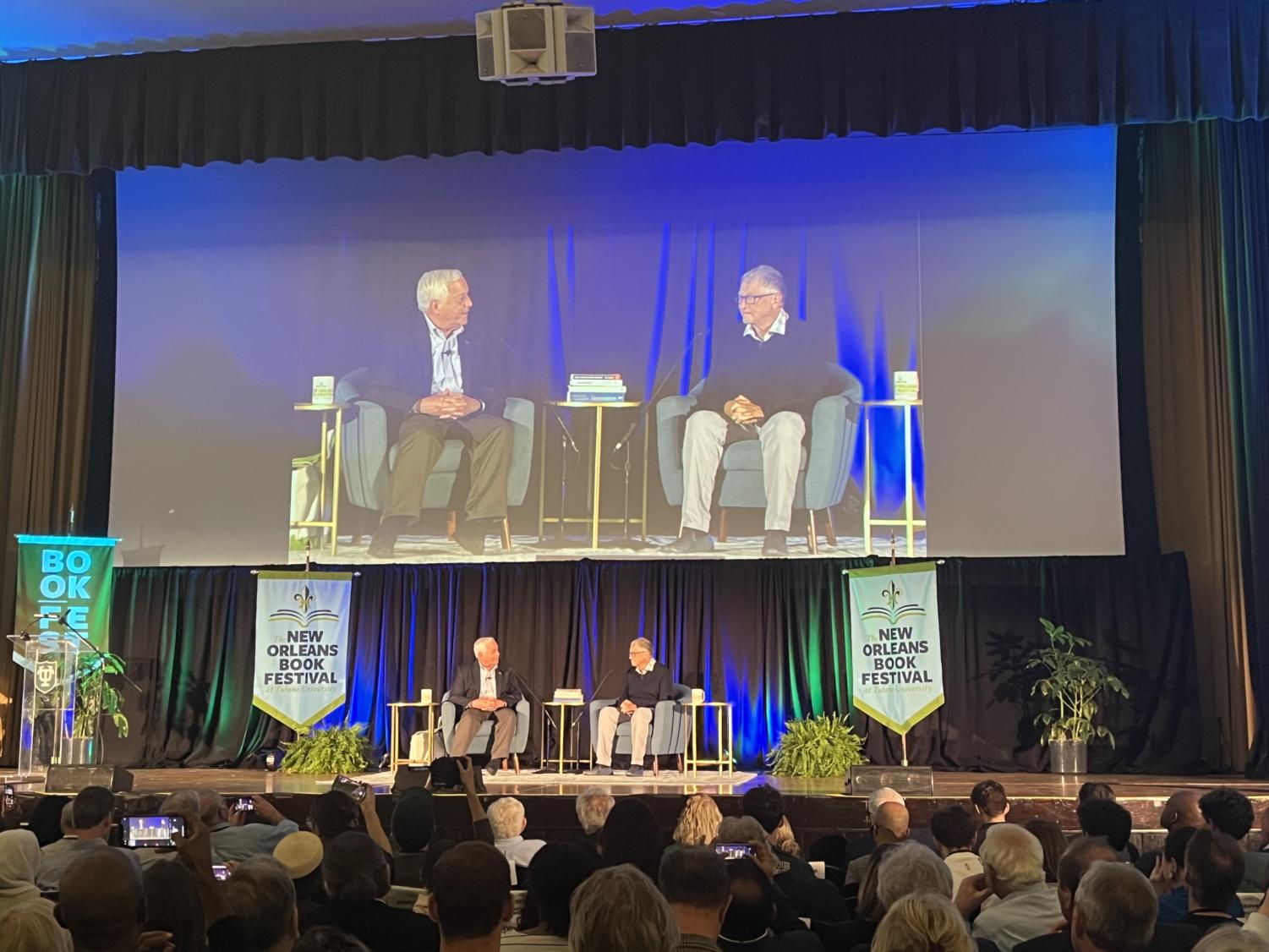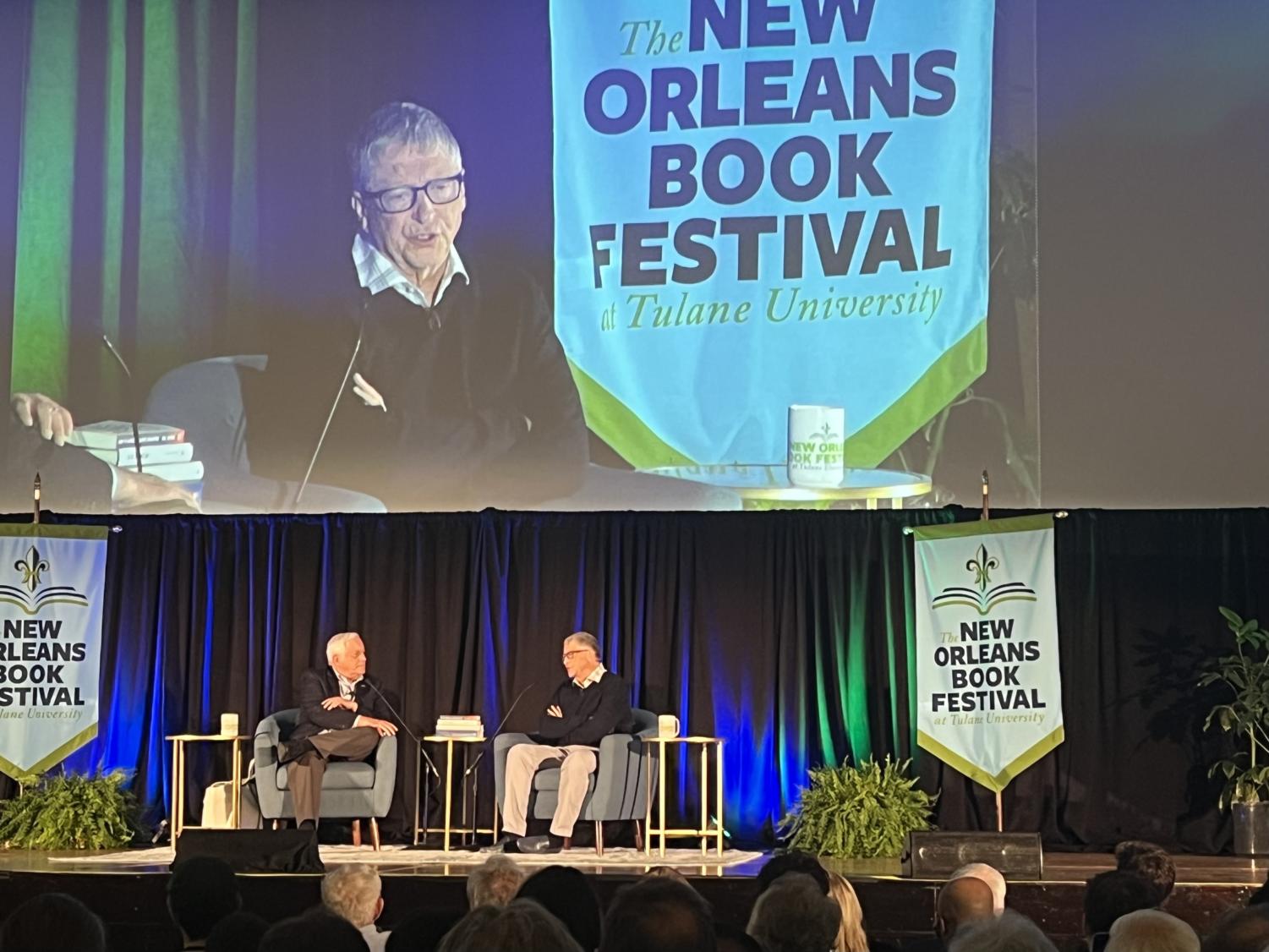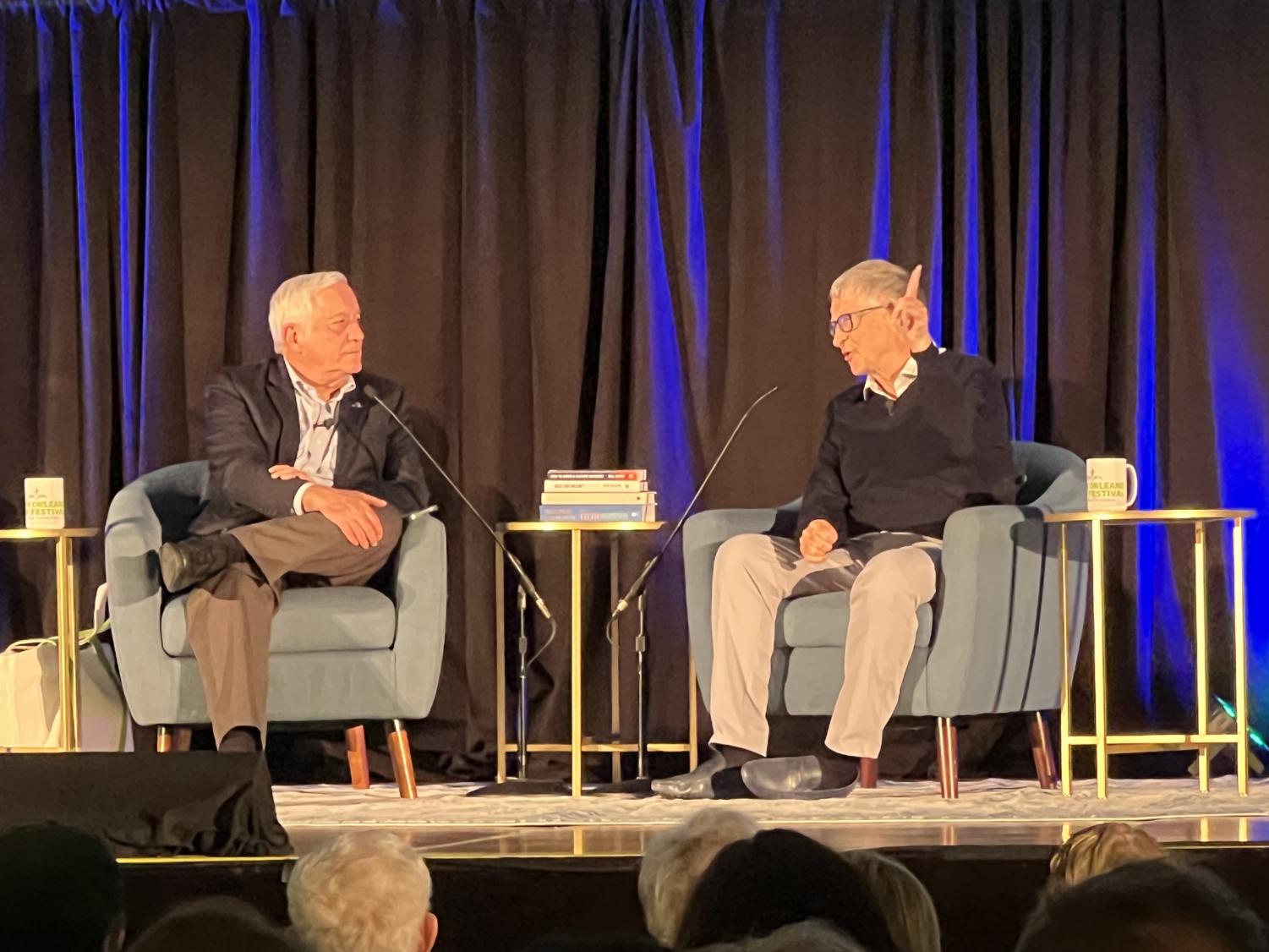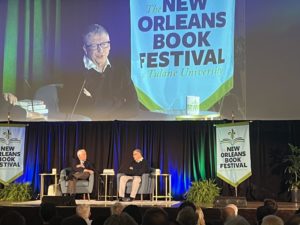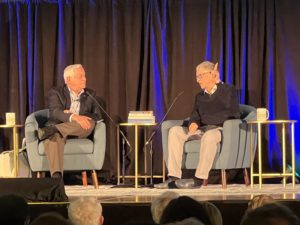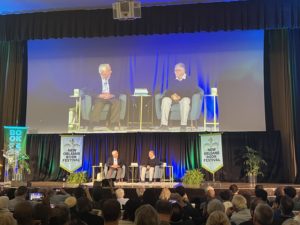Gates, Holder, Rubenstein kick off Book Festival
Thursday marked the opening day for the New Orleans Book Festival at Tulane University, culminating in the highly anticipated appearance of the festival’s headliner, Bill Gates.
Conversing in McAlister Auditorium with Gates was renowned author and Tulane Professor Walter Isaacson. In just an hour, Gates spoke about climate change, global health, education and artificial intelligence.
In front of a packed auditorium, the two began their discussion on climate change. Gates emphasized the importance of working with China in areas of climate innovation and dispelled the notion that competition between the countries must be a “zero sum game.”
Gates, who has invested more than $2 billion in climate technologies, went on to explain new forms of clean energy like sodium-cooled power plants and nuclear fusion, while also delving into the necessity to reform America’s grid system, food industry and industrial processes to become more green.
When the conversation turned to pandemics, Gates expressed the need to learn from mistakes made during COVID-19, including earlier testing and more coherent responses by government agencies.
“What we need though is a team … ready and trained,” Gates said. “When you’re testing like mad, then you don’t need as many lockdowns.”
Gates also acknowledged COVID-19 vaccines were not “infection-blocking” but described future vaccine technology with better capabilities. “You benefit yourself in terms of avoiding serious illness and death. You didn’t really benefit other people,” Gates said.
Students said they were awed by Gates’s breadth of knowledge.
“Gates was able to explain in an in-depth way how vaccines were working and why they didnt work,” neuroscience major Julia Klar said. “I was pleasantly surprised he was so knowledgeable about it.”
Cooper Andrews, a political science major, agreed. “It was a privilege to witness the genius of Bill Gates,” Andrews said. “Isaacson did a phenomenal job of interviewing and created some entertaining exchanges.”
One of these exchanges included Isaacson bringing up the 2001 Microsoft antitrust case, Gates’s only moment of the night when he struggled to articulate an answer. The stammer was followed by a comic exchange between the two and laughter from the audience.
Gates also gave insight into the origins of the Bill and Melinda Gates Foundation. He stepped down from CEO of Microsoft in 2000 to pivot to philanthropy.
“I didn’t want to be a guy in my 60s trying to run a software company,” Gates said. When he began reading about lack of market incentives for treating diseases like malaria and HIV, he recalled thinking, “This is killing millions of children, and nothing’s being done about it. I found myself being drawn into that.”
Towards the end, the conversation turned to artificial intelligence. Gates said humanity is on the verge of an AI revolution.
“If you’re trying to plan a trip to Greece, if you’re trying to research a topic … this thing is miraculously better,” Gates said of artificial intelligence. “It’s likely at some point that [artificial] intelligence will be able to do a lot of things better than humans.”
The night ended with Gates encouraging students to pursue the sciences, incorporating artificial intelligence in areas like climate science, health and education, where he believes innovations are needed most.
Two other notable names helped to commence Book Fest.
Earlier that day in the A.B. Freeman School of Business, billionaire private equity titan David Rubenstein talked about his career in investing with moderator Gary Ginsberg, a lawyer and corporate adviser.
Rubenstein, sometimes viewed as controversial for his early business practices and relationship with the defense industry, reminisced about his unconventional career with both humor and humility.
A former lawyer and government official for the Carter Administration, a job he joked he was unqualified for, Rubenstein talked about leaving politics and founding the Carlyle Group, one of the largest private equity firms in the world.
“He was hilarious,” sophomore finance major Zac Schwartz said. But “also had some of the most unique advice I’ve ever heard.”
Some of this advice included experimenting with different careers at a young age and finding what you love by your “mid to late 30s.” Other ideas discussed included the importance of making connections, comparing cryptocurrency to Las Vegas casinos and philanthropy, a pursuit he is heavily involved in.
Rubenstein ended with a call to action for Tulane students. “I want everybody to think about what they can do to give back to society by giving time or energy to ideas in a way that will make the country better,” he said.
In between Gates and Rubenstein, Eric Holder, who served as Attorney General for the United States between 2009 and 2015, discussed his new book “Our Unfinished March” with CBS News correspondent Michelle Miller. The discussion was centered around voting rights, the topic of his book. Holder began by detailing its evolution from the birth of America up until the Civil Rights Movement and present day.
The importance of knowing the country’s history is a central tenant for Holder, who vividly recalled watching the 1965 Selma march on television as a 14-year-old.
“We have to admit that unless you acknowledge the fact that we make progress, you do a great disservice to people who sacrificed themselves,” Holder said.
Despite this, Holder passionately discussed needed revisions to America’s voting system in order to increase voter access. These included repealing voter ID laws, creating a national holiday for Election Day, ending racial gerrymandering and ending the Electoral College.
Holder and Miller also discussed a wider range of progressive ideas, many of which were met with enthusiastic applause.
“There is, I feel, a progressive era fighting like hell to be born,” Holder said.
Holder also criticized the Supreme Court, describing voter fraud as a myth. When asked what the single greatest threat to democracy was, Holder stated “disinformation.”
Like Rubenstein, Holder ended his conversation with a call to action to students, a central theme of the day.
“We have done a whole host of things that have made this nation exceptional,” Holder said, citing strides in minority, women’s and LBGTQ rights. “That only happens when we decide to get involved. When we decide to commit ourselves.”
Your donation will support the student journalists of Tulane University. Your contribution will allow us to purchase equipment and cover our annual website hosting costs.



